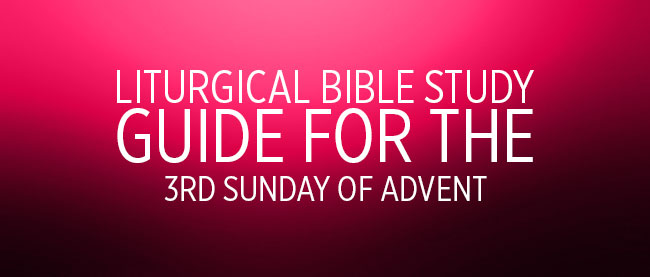Introduction
For the past two weeks we have heard of the Lord’s coming as judge of all at the end of time. The priest wears penitential purple during this season to help us realize our part in turning from God’s covenant and participating in acts of darkness (sin), although pink may be worn on this, “Gaudete”, Sunday. There are images of light and darkness interwoven throughout the season’s readings. The feeling of penitence comes as we force ourselves to compare our dreams, our great expectations, with reality. What keeps us from fulfillment in this moment? What hinders us from seeking the freedom that God offers us? Our fear of the unknown and our anxiety about taking risks often keeps us enslaved in our old ways and prevents us from reaching out for new ones. Our greed and possessiveness keep us from letting go of what we have so that we can seek the next step in life. God will free us from our enslavement to fear, injustice, poverty, negation, and disease if we simply let go and let Him guide us.
Gaudete Sunday, in the preconciliar delineation of the liturgical year, was regarded as a day of particular joy with Advent half over and Christmas soon to follow. The term Gaudete refers to the first word of the Introit (Entrance Antiphon) “Rejoice”, taken from Philippians 4:4-5.
1st Reading – Isaiah 35:1-6a, 10
In last week’s introduction to the first reading we heard that Isaiah was convinced that all Palestine would be laid waste by Yahweh because of the sinfulness of the people. Yet, there would be a remnant who will be the inheritors of the promises made to David.
Undergirding the doctrine of the remnant was Isaiah’s faith in the divine control of history. Even in her greatest hour of trial, with Sennacherib (king of Assyria 705-681 B.C.) encamped under her walls, Jerusalem was promised deliverance if only she would place her trust in God. Isaiah’s faith coupled salvation with repentance and conversion to Yahweh. From this faith stemmed Isaiah’s conviction that Yahweh, faithful to His promises, would raise up a king from David’s line whose rule of peace and justice would replace the faithless and vacillating service of the kings who had ruled from David’s throne.
2nd Reading – James 5:7-10
St. James is called “the younger” or “the less” to distinguish him from James the brother of John. He was the son of Alphaeus (Cleophas) and Mary (a close relative of Mary, mother of Jesus). On account of his close kinship with Jesus he is known as the “brother of the Lord.”
Some years after the Ascension, he was appointed Bishop of Jerusalem by his fellow apostles. St. Paul numbers him, along with Peter and John, among the Pillars of the Church (part of the inner circle). He was called “the just” by his countrymen on account of the austerity of his life and his strict adherence to the Law of Moses. Josephus reports that he was stoned to death by order of the High Priest Ananus in A.D. 62 or 63 (Antiquities of the Jews 20.9.1§197-203).
Sometime between A.D. 50 and his death, James wrote his epistle to the Jewish Christians dwelling in Palestine and adjacent countries. Its immediate destination was probably Antioch, with its strong Jewish population. It was no doubt written from Jerusalem as it doesn’t seem that James ever left it. The main object of this letter is not to teach doctrine, but to improve morals. In the reading for today, these Jewish Christians are reminded of the need for patience, both in bearing the sufferings of human life and in their expectation of the coming of the Lord. When the Lord comes, it is then that they will receive their reward.
Gospel – Matthew 11:2-11
Last week we heard John the Baptist announce the coming of the messiah. This week we hear Jesus affirm that announcement.


